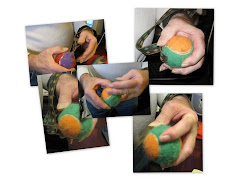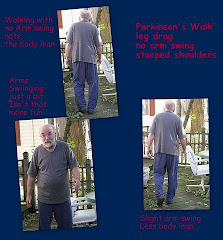Wednesday, January 20, 2010
Urate: Too Much of a Good Thing or Just Right for Parkinson's Disease?
PD, MS and Urate: Is there a future?
We've been trying to write a post about urate, a water soluble antioxidant, and Parkinson's Disease for months now but every time we begin we have visions a great uncle whose gout pain was so bad that he had a 2nd accelerator pedal for his left foot installed for his annual cross country drives to Phoenix, Arizona. How could we write about the relationship of low and high urate levels to PD when there was also a real risk from high levels?
So to get gout off the mind we learned from Johns Hopkins that a malfunctioning gene, ABCG2 appears to be the cause of the high concentrations of serum urate which crystallizes in body tissues within joints. The result of course is inflammation and pain. The process occurs when ABCG2 doesn't make the protein needed to move the urate from the kidneys and down the drain. While not everyone with a high urate concentration develops gout, it is a decided risk factor.
Normally present in the blood and spinal fluid, urate, is a salt derived from uric acid. So why should a high level of urate crystals - and there are many forms of these crystals which can build up in tissue as well as in joints - delay or slow the progression of PD especially in younger men? What appears to happen is that those men with the highest level have the slowest progression and are usually losing the fewest dopamine producing neurons. But why?
According to the Harvard two-year study of male patients in early stage Parkinson's disease, those with the lowest progression had higher levels of urate. It appears that their bodies can metabolize the urate so that it is effective rather than destructive. The result is that fewer dopamine neurons appear to be lost.
Another discovery was that the higher the urate levels, the slower the cognitive decline.
This doesn't mean if you have Parkinson's or Multiple Sclerosis that you should run out to a body building store to buy inosine, the antioxidant precursor to urate. The levels may stem from dietary intake and the proclivities of the individual body to metabolize urate. It would appear far wiser to wait for Dr Michael Schwarzschild, MD, PhD director Molecular Neurobiology Laboratory Massachusetts General Hospital and Dr Alberto Ascherio, Harvard School of Public Health and Harvard Medical School, Boston, MA and teaming with the Parkinson's Study Group of US and Canada to take their studies farther with the support of the Michael J Fox Foundation. Currently SURE-PD (Safety of Urate Elevation in PD) is in phase II clinical trials testing inosine efficacy and safety.
There is, however, a flip side to urate. Normally functioning as an antioxidant, in certain circumstances it can become pro-oxidative. However, ascorbic acid may prevent the prooxidant effects.
There are gout studies which show that intact skim milk might have a urate lowering effect while the control soy milk showed a serum urate increase. Which means we're back to those peculiarities of body chemistry: Parkinson's and higher levels of urate with slower progression while at the same time higher levels of urate are also associated with gout which in turn is associated with a higher risk of diabetes, cardiovascular and chronic pulmonary disease, hypertension, hyperlipidemia and kidney stones to name a few.
What else do we know about urate? We know that uric acid is associated with iron binding properties. Hmm. We know that it is possible to make dietary adjustments to increase plasma urate levels but we don't know whether there will be additional risks of gout or other conditions. A 2008 discovery, thanks to genome-wide association scanning, has been that variations of the SLC249 gene appear more often in those with high serum urate than those with in normal levels. And we know that by increasing dietary intake of fructose and purines the urate levels will rise.
So we await the results of ongoing research which may prove beneficial to men with Young or Early Onset Parkinson's as well as those in the early stage of PD. Because PD treatments are either symptomatic, which may or may not be effective, or neuroprotective, which appears to hold more promise but is less common, we will be very interested in the progress of the SURE-PD trials.
1 comment:
Welcome to Parkinsons Focus Today.
We are delighted to hear from you by comment here
or through email as found in Contact Us.
Please do not include email addresses if leaving a comment online.
Email addresses are used only for email responses.
Spammers take note: your messages will not be published. The comments section is for an exchange of ideas, not for backlinks.
Subscribe to:
Post Comments (Atom)















Did your husband's physicians discuss any past medical history involving either diuretics or nonsteroidal anti-inflammatory drugs (NSAIDs) known to be associated with gout or PD risk?
ReplyDeleteThis blog post does reference the SURE-PD clinical trial which is still recruiting. The is a clickable link in the post above and a copy and paste link below:
http://clinicaltrials.gov/ct2/show/NCT00833690
There is a gout clinical trial recruiting in Duncansville, PA
http://clinicaltrials.gov/ct2/show/NCT00833690
and UPSURGE, another gout trial which is recruiting in 74 locations:
http://clinicaltrials.gov/ct2/show/study/NCT01459796?term=Gout&rank=19&show_locs=Y#locn
This link will take you to ALL OPEN Gout clinical trials:
http://clinicaltrials.gov/ct2/results?term=Gout&recr=Open&rslt=&type=&cond=&intr=&outc=&lead=&spons=&id=&state1=&cntry1=&state2=&cntry2=&state3=&cntry3=&locn=&gndr=&rcv_s=&rcv_e=&lup_s=&lup_e=